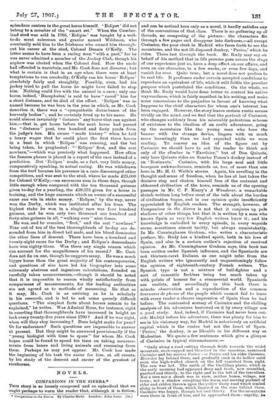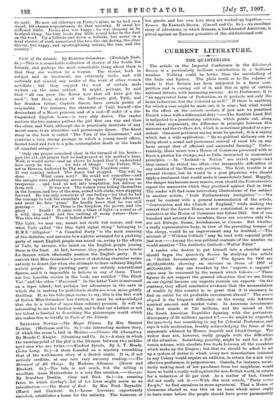NOVELS.
COMPANIONS IN THE SIERRA.* This story is so loosely composed and so episodical that we ought perhaps to warn the reader that, although it is fiction,
* Companions in the Sierra. By Charles Rudy. London : John Lane. [6s.]
and can be noticed here only as a novel, it hardly satisfies any of the conventions of that class. There is no gathering up of threads, no composing of the picture : the characters flit through a few pages and disappear into darkness,—all except Casimiro, the poor clerk in Madrid who fares forth to see the mountains, and the not ill-disposed donkey, 'Perico,' which he rides. These last through the book. Mr. Rudy may say on behalf of his method that in life persons pass across the stage of our experience just so, have a deep effect on our affairs, and even on our character, in a few weeks, or even few days, and vanish for ever. Quite true; but a novel does not profess to be real life. It professes under certain accepted conditions to reproduce an equivalent of life, while it still fulfils the peculiar purpose which postulated the conditions. On the whole, we think Mr. Rudy would have done better to control his native waywardness, which is fairly manifest in his writing, and make some concessions to the prejudice in favour of knowing what happens to the chief characters for whom one's interest has been engaged. However, the story leaves certain rustic scenes vividly on the mind, and we find that the portrait Of Oasimird, who changes suddenly from his miserably pedestrian scheme of existence to the idealism of an exalte adventurer, going up the mountains like the young man who bore the banner with the strange device, lingers with us much more hauntingly than we had expected while we were reading. To convey an idea of the figure cut by Casimiro we should have to ask the reader to think not only of the climber in "Excelsior," but of Don Quixote, only here Quixote rides on Sancho Panza's donkey instead of on Rosinante: Casimiro, with his large soul and little bourgeois awkwardnesses, reminds us, too, of more than on hero in Mr. H. G. Wells's stories. Again, his revelling in the thought and sense of freedom, when he has at last taken the decisive step and shaken himself free of the restraint and abhorred civilisation of the town, reminds us of the opening passages in Mr. C. F. Keary's A Wanderer, a remarkable sketch written long before most of the talk about the burden of civilisation began, and in our opinion quite insufficiently appreciated by English readers. The strength, however, of Companions in the Sierra is not that it conjures up pale shadows of other things, but that it is written by a man who knows Spain as very few English writers know it; and his knowledge is embodied in every episode, in every wayside scene, sometimes almost tacitly, but always unmistakably. In Mr. Cunninghame Graham, who writes a characteristic preface, Mr. Rudy has a kindred spirit, both in his love of Spain, and also in a certain outlaw's rejection of received opinion. As Mr. Cunninghame Graham says, this book has been written under Spanish influence, and the Spaniards are not thirteen-carat Italians, as one might infer from the English writers who ignorantly and unquestioningly follow the opinion of eighteenth-century French writers. The Spanish type is not a mixture of bull-fighter and a sort of romantic feckless being too much taken up with points of honour for a commercial world. Spaniards are realists, and accordingly in this book there is minute observation and a reproduction of the common tournures de _phrase of the people which cannot fail to leave with every reader a clearer impression of Spain than he had before. The contrasted ecstasy of Casimiro and the chilling analysis of his adventure bestowed on it by every village are a good study. And, indeed, if Casimiro had never been out. side Madrid before his adventure, there was plenty for him to see in his visionary way, for Madrid is notoriously an artificial capital which is the centre but not the heart of Spain. 'Perico,' the donkey, is as likeable in his different way as Modestine. We quote a few sentences which give a glimpse of Casimiro in typical circumstances :—
" Gaily along a road cutting through fields towards the violet mountain, snow-capped and bleached in the sunshine, sauntered Casimiro and his master Perico—or Perico and his rider Casimiro. MOstoles lay behind them, and gradually sunk in its hollow until even the high-walled church on the hill vanished from sight. The sun was hot. The earth of the Castillian plains, which in the early Morning had appeared dewy and fresh, now crumbled, parched and thirsty, to the right and to the left of the travellers. Not a tree nor a shrub was in view, neither house, village, not town; not a shadow excepting the warm and moving portrait of rider and ridden thrown upon the yellow dusty road which trailed along in front of them, which lingered in the rear behind them. Casiiniro was happy, though hot and thirsty. For the mountaitut were there in front of him, and he approached them—rapidly, he thought. Ho now sat sideways on Pence's spine, as he had seen Angel, his chance acquaintance, do that morning. It eased his stiffened limbs. Perico also was happy ; lie was sleeping as he -trudged along ; his tiny hoofs dug little round holes in the dust on the road. Up a hillside and down a hillside, but never on a level stretch of road, meandered the two, the one dozing, the other thirsty, but happy, and apostrophising nature, the sun, and the country."







































 Previous page
Previous page